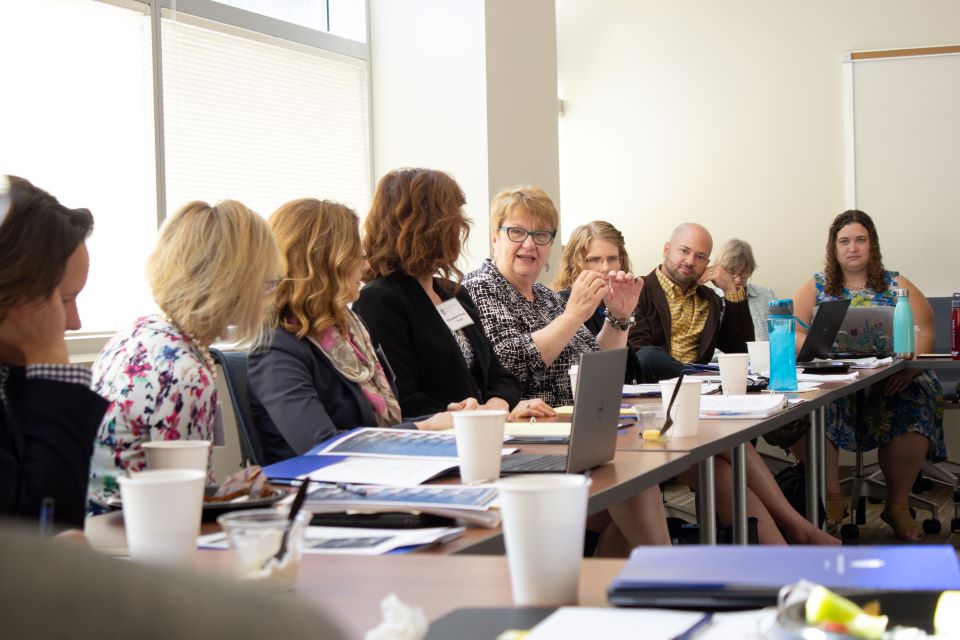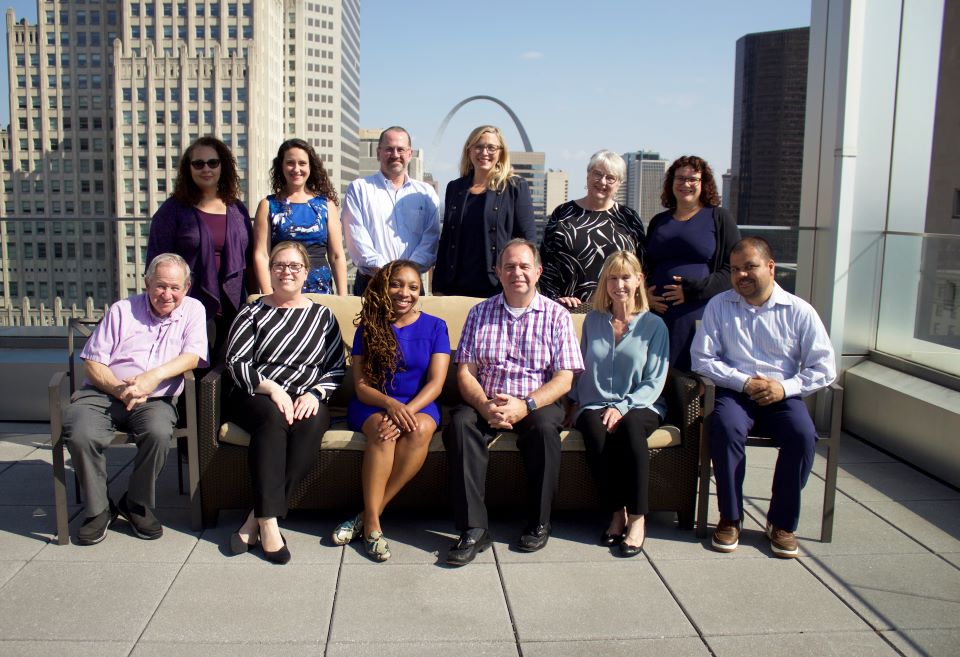At the Intersection of Law & Policy: Celebrating 40 Years of the Center for Health Law Studies
As the field of health law has evolved over time, so too has the Saint Louis University School of Law Center for Health Law Studies. With an eye towards policy matters, advocacy, and creating opportunities for the law to influence and improve health care across the nation, the Center is an enduring reflection of the world it has existed in for the past 40 years. As we take time to celebrate the longevity of the program, we must recognize how the Center has evolved over time in an effort to make a lasting impact on the world around us.
What started infamously as a diagram on a napkin at Humphrey’s is now an influential place to teach, learn, advocate, and promote change.
“I think what has always defined the Center and will continue to is a commitment to an excellence in teaching and meaningful scholarship that informs the practice of medicine and health – with a focus on service to the community and to justice” says Sidney D. Watson, the Jane and Bruce Robert Professor of Law, a former director of the Center, and a member of the faculty for the past 23 years.
Focusing on scholarship and innovation continues to attract top talent in both students and faculty. The Center has recently added three scholars with impactful research and scholarship. Dr. Michael Sinha, a physician and health law scholar; nationally recognized drug policy expert Kelly Gillespie; and federal health policy advisor Jamille Fields Allsbrook. Also visiting for the full academic year is Taleed El-Sabawi, a mental health policy expert visiting from Florida International University College of Law. Each of these scholars brings with them impressive work that will ultimately influence health policy and legislation around the world.
The ongoing recognition of the Center in the rankings is gratifying, and it helps people learn about us when they are new to health law. But the key to the Center's success is our ongoing commitment to harnessing the law to improve the health of our community
Robert Gatter, professor and director of the Center for Health Law Studies
This does not come as an accident. The Center is widely known for its preeminent reputation, having spent all but two years as the number one program in health law as ranked by U.S. News & World Report since the specialty ranking’s began nearly 20 years ago.
“The ongoing recognition of the Center in the rankings is gratifying, and it helps people learn about us when they are new to health law. But the key to the Center's success is our ongoing commitment to harnessing the law to improve the health of our community; and the Center does this through the students we teach, the alumni we celebrate, the work we publish, and the service we provide to others. This makes us a premier health law program. That’s how the center was when I came to SLU. I inherited a great program and the responsibility to keep it up,” says Professor Rob Gatter, the current director of the Center for Health Law Studies.
This distinguished reputation has been intentionally crafted over the years through programming, partnerships, courses, hiring practices, and careful attention to the social justice mission of the law school and University.
The creation and success of the Grassroots Advocacy course is a perfect example of the Center’s efforts to blend impact with education. Initially funded with support from the Missouri Foundation for Health, the course was created following the passage of the Affordable Care Act (ACA). The purpose was to support the work of a coalition of Missouri consumer organizations and safety providers who came together to support the implementation of the ACA and Medicaid expansion. Students in the course worked with Professor Sidney Watson, the creator of the course, to provide the coalition with plain-language legal and policy analysis, community education, story banking, strategic planning, and testimony at legislative and administrative hearings.
Over the years, course participants have shared success with Missouri health advocates, as Medicaid expansion was successfully passed in the state. But that is not the only success accredited to the class.
“Through the class, we sought to train the next generation of health policy advocates to serve Missouri and the nation,” said Watson. “It worked: Today, graduates of the Grassroots Advocacy class work in policy advocacy jobs in Missouri, DC, and elsewhere. Three of the students from the course—Alix Cossette, Geoff Oliver, and Sami Schrage Bunk--were part of the legal team that successfully sued to bring about Medicaid expansion in the states.”
The Grassroots Advocacy class can also be accredited for an ongoing relationship with Missouri Appleseed. Through research, advocacy, and education, Missouri Appleseed works to improve the systems and policies at the intersection of public health, criminal justice, and child welfare. An alignment with the scholars and students in the Center for Health Law Studies was a natural fit.
The organization quickly teamed up with the students in Professor Watson’s class working on Medicaid expansion in Missouri. Together they successfully advocated for a change in Missouri law and policy that now requires the state to suspend, as opposed to terminate, Medicaid when an individual is arrested. The change allows for people returning home from incarceration to immediately access health care.
Of the partnership, Missouri Appleseed Executive Director Liza Weiss touts the successes. “After the initial successful Medicaid advocacy, SLU LAW students have gone on to help Missouri Appleseed ensure that incarcerated women are provided free quality feminine hygiene products, create a prison nursery so women are not separated from their newborns hours after birth, and advocate for legislation that requires judges to consider the effects of incarceration on children when sentencing primary caretakers,” she said.
Policy research and advocacy with Center students and professors has never stopped at the Missouri state line. Over the years, 50 students have spent a semester in Washington, D.C. working as law clerks in a health-related agency for the entire semester where they begin to grow a network of contacts within the federal government. This program is hugely successful because of the number of SLU LAW alums working in the region. From federal agencies like U.S. Department of Health and Human Services and U.S. Department of Justice to advocacy organizations like National Rural Health Association and National Health Law Project, SLU LAW alums can be found all over the U.S. capital region crafting, influencing, and advocating for policies crucial to the growth of the nation. New faculty member, Jamille Fields Allsbrook is a perfect example of this connection. Before joining the faculty, she served as the senior policy advisor in the Office of Population Affairs in the United States Department of Human and Health Services and previously worked as the director of women’s health and rights for the Center for American Progress.
Beyond policy work, the Center is also widely recognized for producing, fostering, and training some of the professions’ most influential scholars. Each year, the Center for Health Law Studies hosts the Health Law Scholar’s Weekend. This workshop, sponsored in conjunction with the American Society of Law, Medicine and Ethics (ASLME), allows scholars and mentors to collaborate, network and engage in new discussions about health law. Now the director of the Center, Gatter was one of the first scholars in 2002. He also was one of the people to propose the idea for the event. Of his time as a young professor attending the workshop, Gatter said: “It was the most important professional weekend of my life.”
 The Health Law Scholars Workshop is a collegial forum in which faculty new to health
law and bioethics scholarship present works in progress and receive in-depth advice
from experienced scholars and teachers in the field. The workshop encourages health
and bioethics scholarship, fosters the professional development of emerging scholars,
and furthers the sense of community among health law academics. Past scholars have
placed their papers for publication in preeminent law journals. Over 22 years of the
workshop has seen many remarkable scholars, many who have returned later as mentors
as well as tenured and visiting professors.
The Health Law Scholars Workshop is a collegial forum in which faculty new to health
law and bioethics scholarship present works in progress and receive in-depth advice
from experienced scholars and teachers in the field. The workshop encourages health
and bioethics scholarship, fosters the professional development of emerging scholars,
and furthers the sense of community among health law academics. Past scholars have
placed their papers for publication in preeminent law journals. Over 22 years of the
workshop has seen many remarkable scholars, many who have returned later as mentors
as well as tenured and visiting professors.
“You’d think it’d be intimidating, but the scholars receive so much support and clarity,” Gatter said. “[The Center for Health Law Studies] wants to be a place where scholars can come and receive support.”
As the United States grapples with an ongoing opioid crisis, it is some of the Center’s scholarship that is playing a part in addressing the problem. Professor Kelly Gillespie, a former registered nurse, is widely recognized for her contributions to the drive for change. She is the co-author of an amicus brief in the recent United States Supreme Court case, Ruan v United States that examined a physician’s responsibility in the overprescribing of opioids. The Court’s ruling ultimately aligned with Gillespie’s brief, stating that the crime of prescribing controlled substances outside the usual course of practice requires that the defendant “knowingly or intentionally” acted in an unlawful manner. (For more on Professor Gillespie’s scholarship).
It is contributions such as this that will have a lasting impact on health law policy across the United States for years to come. As the Center looks towards another 40 years of producing top health law policy makers, advocates, and mission driven attorneys, there is no doubt that the growth and success of the Center for Health Law Studies will continue to be an integral part of the health law field.
By: Jessica Ciccone and Elliot Laurence
This article appeared in Volume 23 of the SLU LAW Brief that was published in December of 2023.
